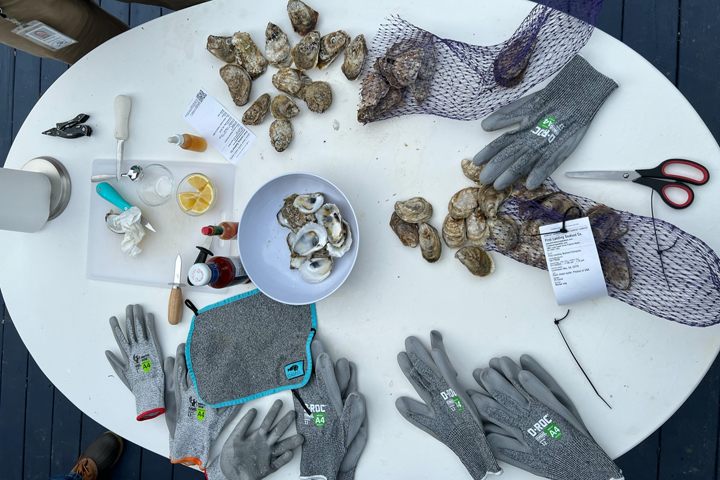When English colonists arrived on Virginia’s shores in 1607, their very first meal featured oysters from the Lynnhaven River. Lynnhaven oysters, later dubbed Lynnhaven Fancies by Queen Victoria, became a favorite around the world. Over the last century, however, pollution, disease and overharvesting drastically reduced their population.
Now, Lynnhaven Fancies are back.
In June, First Landing Seafood of Virginia Beach re-introduced these plump, salty delicacies — carefully cultivating an oyster that lives up to the standards of the original. This breed of oyster complements First Landing’s wild-caught oysters, marketed as Lynnhaven Legacies.
The company’s catchphrase: Every oyster counts.
“I don’t know if I’ve ever seen a crop or a business model in the food industry that’s actually net-net as beneficial as oysters are to the environment,” says venture capitalist and Virginia Beach native Bay McLaughlin ’06, M.Acc. ’07, who launched First Landing in 2021 along with his brothers Bruce and Craig.

Tying consumption to conservation
Remarkably, individual oysters can filter up to 50 gallons of water per day, removing harmful pollutants like nitrogen and phosphorus. Their reefs provide a welcome habitat for a variety of marine species and also help to prevent shoreline erosion.
Seeing significant benefits for both the marine and human population, McLaughlin sought to support other oyster farmers in the region as well.
“I was interested in how to make profitable farming business models on the water that tied consumption to conservation,” he says. “I’d seen that in all sorts of businesses I’d invested in, but I hadn’t seen that here.”
McLaughlin, who maintains close ties with his alma mater, had noted the announcement of William & Mary’s new Institute for Integrative Conservation (IIC) in 2020. He connected with IIC Faculty Director John Swaddle and found immediate interest.
“It was really good timing. They happened to be focusing on the exact things I was focusing on,” McLaughlin says.
“Classically, when a university gets involved in this kind of thing, it’s often in the nonprofit world,” Swaddle says. “But realistically, to address the biodiversity crisis, we need to expand to the for-profit sector and really think about ways in which we can help businesses make positive contributions to the environment.”

‘A real win’
McLaughlin submitted a project proposal for the IIC’s year-long Conservation Research Program, which pairs interdisciplinary teams of W&M faculty and students with outside organizations to conduct applied research on pressing conservation issues.
Taking the lead on McLaughlin’s project is Grace Dho ’23, a biology and environmental science major at William & Mary, who is spending the year researching business models for sustainable oyster aquaculture, including the development of a farmer cooperative.
To collaborate on the project, the IIC brought in William & Mary faculty experts from the Alan B. Miller Entrepreneurship Center at the Raymond A. Mason School of Business and the Virginia Institute of Marine Science. McLaughlin also cites W&M Law School’s Virginia Center for Coastal Policy as a key resource.
“It’s great for me to hear people who are primarily concerned with sustainability talk about business models,” says Graham Henshaw, executive director of the W&M Entrepreneurship Center.
“That’s consistent with what we’re trying to do as a center — equipping people with a toolkit to make more meaningful progress on their endeavors. It’s a real win when there’s a social benefit, or a benefit to the planet.”
In addition to Swaddle and Henshaw, Dho has been working with two VIMS faculty members: Acuff Professor of Marine Science Bill Walton and VIMS Associate Dean of Research and Advisory Services Mark Luckenbach.
This multidisciplinary collaboration highlights William & Mary’s unmatched expertise in addressing a key initiative of the university’s Vision 2026 strategic plan: finding innovative solutions to ensure the resilience of the world’s waterways.
“This work is happening in parallel with some other collaborative efforts underway around climate adaptation,” Henshaw says. “We see a link between these different fields where we can all contribute and have a bigger impact as a collective than if we pursued it through our individual disciplines.”

‘Truly amazing’
Dho has already completed the first phase of the project, creating an evidence-based management practices manual for oyster farmers.
“When we talk about creating a business model that focuses on sustainability, we need to make sure that there are scientifically proven tasks that make it sustainable,” she says.
These include everything from taking precautions in areas with fragile submerged aquatic vegetation to releasing marine species caught in oyster cages.
During the summer, Dho has been assessing the feasibility of the manual and the co-op business model by interviewing stakeholders, including restaurant owners and oysters growers in Virginia and Maryland.
“One big thing is making sure that everything is reproducible,” she says.
“Grace has done an incredible job,” says Swaddle. “She’s been the leader, the diplomat. For someone at her stage it’s truly amazing.
“This is not only about producing a new type of business model for oyster aquaculture,” he adds. “This is also about helping young professionals launch into the world in really successful ways.”

Lynnhaven legacy
Through his collaboration with William & Mary, McLaughlin is helping to create a new legacy for the Lynnhaven River and the Chesapeake Bay. “This is just the beginning of a variety of ways to become involved,” he says. “There’s a lot more to come.”
At the same time, he is building on a 400-year-old legacy of oyster harvesting in region, which includes his family’s original business, the Lynnhaven Oyster Company.
“A lot of people ask how they can help,” McLaughlin says. “Honestly, it’s about eating and promoting oysters. It’s just that simple.”

